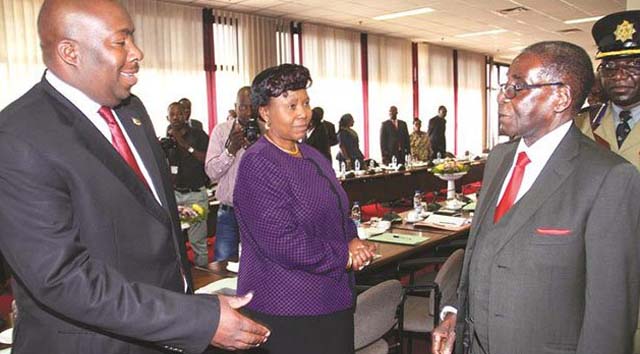Command agriculture, Ben Freeth and racist anger


Ben Freeth
Tichaona Zindoga Political Editor
For obvious reasons, he derides the programme and wishes it all the ills of failure, which in turn should be blamed on the Government and “inept” black farmers. Freeth does not even regard blacks as real farmers but “so-called farmer(s)”.
Sometime in July, during a dinner he hosted for some select senior journalists in Harare, Chinese Ambassador to Zimbabwe Mr Huang Ping said something that is very important in not only in defining the economic relations between his country and Zimbabwe but in speaking to the philosophy of development of the Asian giant.
In an informal dinner talk, the ambassador spoke of the important role that agriculture plays in a country like Zimbabwe, emphasising the need to focus on the sector and allow it to grow by stages.
Effectively, he was like saying, “Seek ye the growth of agriculture first – and everything shall be given unto you’’.
He argued that when the farmer was empowered, he would grow and sell surplus and have money to spend.
This farmer would buy a bicycle, or a car and thus necessitate the need to build roads and other infrastructure.
Right now China could give Zimbabwe huge loans in terms of money or build big projects, argued the envoy, but that would not help the economy if it did not address the core issue of agriculture and bottom-up, agro-based development.
Besides, where can Zimbabwe find the money to pay huge sums of money in loans for capital projects such as a speed rail that could as well lie idle or be underutilised?
There is a simple logic to this proposition.
Besides, elementary knowledge of economics tells us how Zimbabwe is an agro-based economy and is likely to remain so as a developing African country for some time.
With this background, the introduction of the $500 million Command Agriculture by Government in late July is a step in the right direction for Zimbabwe.
The programme is earmarked to have 400 000 hectares under a Government-supported crop production scheme in which farmers offer their land and are given inputs.
In turn, they surrender half of the expected 10-tonne-per-hectare yield.
Prime cropping provinces of Mashonaland East, Mashonaland West and Mashonaland Central are the main targets for the scheme, with parts of Midlands and Manicaland also being considered.
According to plans, farms should be near water bodies and each having the capacity to put a minimum of 200 hectares under maize.
Irrigation equipment should be resuscitated and repaired where they are broken down and derelict.
Already the programme has gained momentum and the hype is growing by the day.
The programme is important in two major ways, that is, the alleviation of hunger and the ensuring of food security; and economic development.
After years of drought and food insecurity due to poor rains and low productivity on the land, the programme is set to turn around the fortunes of the country by adding 2 million tonnes of grain into the national basket.
That will be a good way of making Zimbabwe reclaim its so-called breadbasket status and avoid the ignominy and economic burden of grain imports.
Hunger has stalked Zimbabwe and some figures say up to 4 million people this year require food aid.
Command Agriculture is by all means an ambitious project – which we should all wish well – not least because there have been other initiatives such as Maguta/Inala programme that were not exact successes due to a panoply of reasons, including inclement elements.
Yet it raises significant stakes from the onset.
You have to read a recent piece by white former commercial farmer Ben Freeth, who is associated with attempts to reverse land reform in Zimbabwe including ill-fatedly at the Sadc Tribunal.
For obvious reasons, he derides the programme and wishes it all the ills of failure, which in turn should be blamed on the Government and “ïnept” black farmers.
Freeth does not even regard blacks as real farmers but “so-called farmer(s)”.
He would like the world to believe that Command Agriculture is a corrupt scheme for Zanu-PF “cronies”.
He writes: “An opportunity such as this, which will give the so-called farmer both status and financial benefit, will have significant appeal. In a country where poverty is dire, where the vast majority of title deeds have been nationalised, and where the banks have run out of money, it’s almost impossible to get money from anywhere on that scale.”
The cynicism does not end there.
“In my view, the entire Command Agriculture concept is another blundering, totalitarian control and patronage scheme that is doomed to fail to feed the nation. Stalin, Mao, Polpot, and others, in the days before food aid, oversaw comparable schemes and millions of people perished,” says Freeth.
It does not take a genius to realise this bigoted, racist rant for what it is.
It is a still-seething anger at land reform by whites who thought they had eternal title to colonially stolen land.
In Freeth and his ilk’s view, land reform should simply be reversed and whites regain title.
Thus Freeth prays: “I am confident that when change comes, a new, elected Government will be committed to empowering and supporting those who genuinely wish to farm. Every successful agricultural nation has achieved success on the back of title deeds being issued and upheld as sacrosanct and the new Government will see that. Although the day has not yet dawned, I believe that the protest action taking place across the country indicates the tide is turning and that Zanu-PF’s totalitarian and controlling rule is at last beginning to draw to a close.”
The stakes are high and a programme like Command Agriculture cannot afford to fail – at least after its teething problems.
It is hereby suggested that the programme should stand on the pillars of “4As” to be successful:
Accessibility
All farmers with land and the water and irrigation resources in the said productive regions should be able to be part of the programme, now and going forward. Government-provided inputs such as seed, fertilisers, machines/equipment, etc, must be availed in time and according to needs.
Extension services should be provided to farmers so that they make the best use of knowledge and technical support to boost yields.
Acceptability
Zimbabwean farmers must, subject to the above, be able to identify with the programme and accept it as a strategic national programme. This will not be a problem, though, as many on the farms know what ought to be done – and who has to do it. With jackals like Freeth standing by the fence, farmers should know only full well to be productive and guard against any lapses or cause to fail and justify the jaundiced racist views and sense of entitlement by the likes of Freeth. Here, in pushing the agenda of Command Agriculture, is one of those times when Zimbabweans should always rediscover the “You-and-me-have-a-duty” philosophy.
Accountability
The programme will only succeed when there is accountability and farmers put to use resources committed to them. Past programmes of goodwill such as farm mechanisation fell foul of farmers deciding not to use the equipment for productivity but selling inputs and implements for a quick buck. You do not exactly blame the likes of Freeth for their imagination of black savages partying on resources availed for the programme like some creatures of the African wild. Black farmers have not acquitted themselves the best previously, and it is hoped that lessons have been learnt both by themselves and those who are tasked with ensuring that the letter and spirit of such initiatives are upheld.
Adaptability
The 2016 phase of Command Agriculture is by all means a trial, pilot project. The hope and expectation is that the model is not only expanded to cater for more farmers in the coming years but also broadened to include other sectors in agriculture as indeed other facets of the economy. The applicability aspect of this programme is key and it may yet set the tone for a more structured and focused economic approach that will lift Zimbabwe.
And with agriculture, the beginning is just right.








Comments